
Feb 26, 2015 | Focolare Worldwide
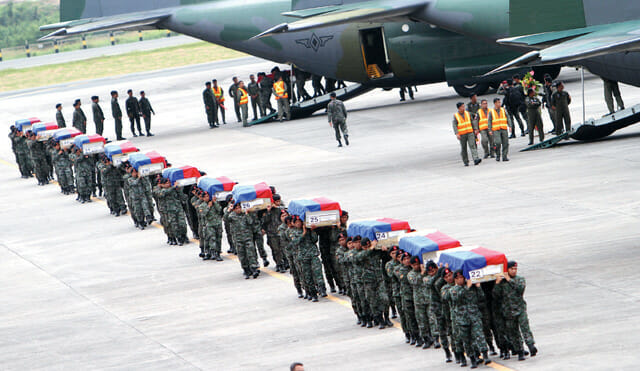 «The country is undergoing a very difficult period. In fact a police contingent sent to arrest some terrorist suspects, was attacked by the fighters of the Moro Islamic Liberation Front and 44 policemen were killed. The Parliament was just deliberating on the new peace treaty between the government and Muslims of Mindanao, with extensive grants in many fields. However, these were blocked and yesterday a video network showed the video of a wounded policeman who was repeatedly beaten to death by a militant of the Front. The indignation of the people was unimaginable!» wrote Carlo and Ding from Manila. Oscar works instead in the government’s Communications Office which therefore had to report on the event. It was not an easy task for one like him who is daily committed to living the spirituality of unity with everyone. «In my job – he wrote– I have to oversee all that happens in the Social Media. This morning I saw the video of our SAF people (policemen) killed by the Muslim rebels. I was very shocked on seeing a policeman on the ground, wounded but still alive, being hit twice on the head and another gutted out with a sickle in his chest… It was terrible, almost surreal, and I couldn’t breathe. The video also showed the rebels gather the arms and personal effects of the policemen and then continued to shoot. It was so hard to think of peace while I was watching those images. I wanted to react, do something. I was almost in tears. Then, watching the sessions of Parliament regarding the event. Some tried to blame a general for his imprecise instruction, and others accused other officers for lack of coordination. Once again I thought, how can we talk of peace? The video on the internet has already been viewed by at least four million people. Part of my work consists in seeing the possible scenarios of a way out. So I ask myself what could be the worst scenario, and I felt fear. I imagine that after seeing those images, many could be overcome by anger and seek revenge. They could see in every Muslim a possible aggressor and turn against him. “And what if a civil revolt is triggered?” I wondered. In the office, as can be imagined, my colleagues were highly emotive. I tried to listen to what God was saying to me in my heart: “More than ever we have to speak of peace. If those among us who have a better view of the situation feel these sentiments of revenge, how will the more emotive and less informed people react?”
«The country is undergoing a very difficult period. In fact a police contingent sent to arrest some terrorist suspects, was attacked by the fighters of the Moro Islamic Liberation Front and 44 policemen were killed. The Parliament was just deliberating on the new peace treaty between the government and Muslims of Mindanao, with extensive grants in many fields. However, these were blocked and yesterday a video network showed the video of a wounded policeman who was repeatedly beaten to death by a militant of the Front. The indignation of the people was unimaginable!» wrote Carlo and Ding from Manila. Oscar works instead in the government’s Communications Office which therefore had to report on the event. It was not an easy task for one like him who is daily committed to living the spirituality of unity with everyone. «In my job – he wrote– I have to oversee all that happens in the Social Media. This morning I saw the video of our SAF people (policemen) killed by the Muslim rebels. I was very shocked on seeing a policeman on the ground, wounded but still alive, being hit twice on the head and another gutted out with a sickle in his chest… It was terrible, almost surreal, and I couldn’t breathe. The video also showed the rebels gather the arms and personal effects of the policemen and then continued to shoot. It was so hard to think of peace while I was watching those images. I wanted to react, do something. I was almost in tears. Then, watching the sessions of Parliament regarding the event. Some tried to blame a general for his imprecise instruction, and others accused other officers for lack of coordination. Once again I thought, how can we talk of peace? The video on the internet has already been viewed by at least four million people. Part of my work consists in seeing the possible scenarios of a way out. So I ask myself what could be the worst scenario, and I felt fear. I imagine that after seeing those images, many could be overcome by anger and seek revenge. They could see in every Muslim a possible aggressor and turn against him. “And what if a civil revolt is triggered?” I wondered. In the office, as can be imagined, my colleagues were highly emotive. I tried to listen to what God was saying to me in my heart: “More than ever we have to speak of peace. If those among us who have a better view of the situation feel these sentiments of revenge, how will the more emotive and less informed people react?”  One of my colleagues suddenly said: “Peace is unpronounceable at this moment. We have to focus on the unity of all the Filipinos, beyond every religious creed. And another said “What happened was an act of violent men who cannot be identified with the entire Muslim community.” Slowly, the anger began to die down. We also remembered what a Mindanao deputy had said: “We are easily angered and influenced by our emotions, because we have not seen with our own eyes the effects a war at our doorstep would have. War is not the answer.” I was pleasantly surprised and left the meeting with a sort of peace inside. In these times, more than anything else, I think we have to work together to bring the ideal of unity to as many people as possible. The menace of war is real. The menace of our compatriots who are angry with our Muslim brothers is real. But the Gospel shows us the path of dialogue and peace. Tomorrow will be a new day for me, another day of listening to many conversations online. I will have the chance to build relationships based on trust and peace. »
One of my colleagues suddenly said: “Peace is unpronounceable at this moment. We have to focus on the unity of all the Filipinos, beyond every religious creed. And another said “What happened was an act of violent men who cannot be identified with the entire Muslim community.” Slowly, the anger began to die down. We also remembered what a Mindanao deputy had said: “We are easily angered and influenced by our emotions, because we have not seen with our own eyes the effects a war at our doorstep would have. War is not the answer.” I was pleasantly surprised and left the meeting with a sort of peace inside. In these times, more than anything else, I think we have to work together to bring the ideal of unity to as many people as possible. The menace of war is real. The menace of our compatriots who are angry with our Muslim brothers is real. But the Gospel shows us the path of dialogue and peace. Tomorrow will be a new day for me, another day of listening to many conversations online. I will have the chance to build relationships based on trust and peace. »
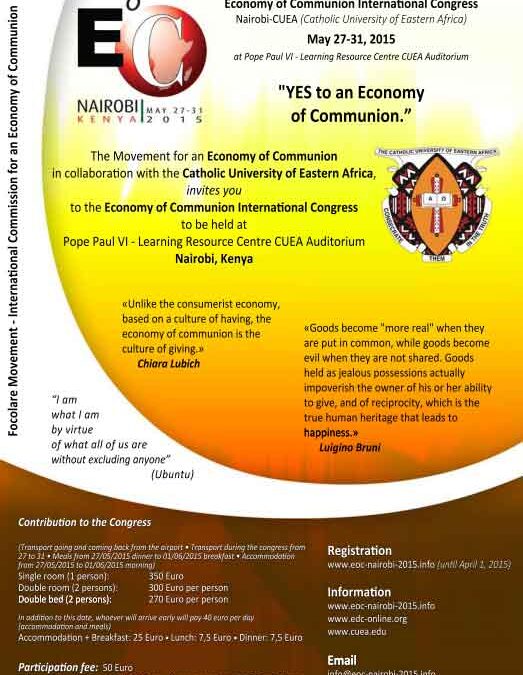
Feb 23, 2015 | Focolare Worldwide
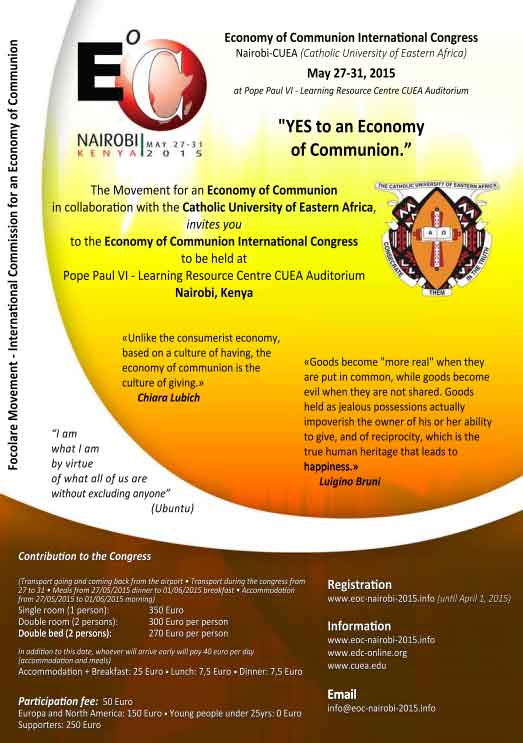 “Remember, Luigino, I created the EoC for the poor. You do well to study, but always remember the poor.” Chiara Lubich repeated these words to me many times in the ten years in which I joined her in the international commission, to coordinate the EoC.
“Remember, Luigino, I created the EoC for the poor. You do well to study, but always remember the poor.” Chiara Lubich repeated these words to me many times in the ten years in which I joined her in the international commission, to coordinate the EoC.
To redeem people from the poverty they suffer (quite different from the poverty they choose) continues to be the ultimate goal of the project, the meaning of our actions. As long as there are people on earth who cannot have a decent existence for lack of resources, no economic and social system can be defined as just, and much less as being one of communion.
The types of poverty loved and alleviated by the EoC in these 23 years of life have diversified and expanded. From the favelas of São Paulo and Brazil, we immediately passed on to the favelas of many cities; then we realized, through the tenacious action of entrepreneurs like Paco Toro (Spain) that to reduce poverty we could create jobs and together with the NGO called Azione Mondo Unito (AMU; Action for a United World) we started to support the development of micro production activities in various countries of the world. Finally, we observed that the present crisis had brought back old and new types of poverty into our rich Europe, too. Among these types there is the plague of gamble, which is devastating hundreds of thousands of families, especially the poorer ones. Hence the commitment of the EoC Italy to support the Slotmob campaign, which has taken place in more than 70 cities in just one year and is changing the mentality of many people.
Furthermore, in recent years, the EoC has been spreading especially on the African continent, where the number of companies that this year have started to pay profits to support the world’s poor rose to 10, while 12 others have approached the project; there are several scholarships offered to young Africans, some of whom diligently attend the Sophia University Institute.
So, feeling attracted by this new and flourishing way of life, as an expression of reciprocity,  we chose Nairobi, Kenya, to be the venue of our international congress, four years after the one that was held in Brazil in 2011.
we chose Nairobi, Kenya, to be the venue of our international congress, four years after the one that was held in Brazil in 2011.
We will be in that great city from 27 to 31 May and from 22 to 26 May for the first Pan-African school for young people that will also take place there. A continent that is still suffering too much because of predatory relations that many industrialized countries have had and continue to have with it (before forgetting it and then isolating it), when feeling the danger of infection, Africa is destined to be the main protagonist of the economy and society of tomorrow.
Africa’s love of life, its youth, its ancient cultures, all these say it already in a powerful way. The EoC wants to go to Africa to love it, to learn from its culture of life, to practice communion and reciprocity. And to construct a new development model and a new economy. But we want to do this together, and in mutual esteem. At the feast of the peoples.
Luigino Bruni
EdC online
Registration: www.eoc-nairobi-2015.info
Info: info@eoc-nairobi-2015.info
Feb 20, 2015 | Focolare Worldwide
«Bishop Giovanni Martinelli is a little giant. A brave person who, despite the serious health problems besetting him for two years now, continues to “doggedly” stay on in his Libya, and with love take care of his sheep, now just a handful of Filipinos working in the hospitals as nurses and who “cannot” leave the country.
He started by saying, “I have nothing special to say – we have become orphans of the ambassador who has left. But I repeat, I have nothing to say; we are here because Jesus wants us here. I am at the service of this population, and not for any kind of power.”
How about the Catholic community? The Christian communities are still here, we are fine.”
Are you serene? “We have just celebrated Mass. God is with us, what should we fear?”
Is also Fr. Sylvester still in Bengasi? “Of course – Bishop Martinelli answered – also he says that we can stay on to be close to the people who are suffering so much.”
What do you forecast for the future? “It is very hard to make a forecast, or rather, it would be better not to since we had forecasted events that did not come about. We live day by day, or rather, moment after moment. The present moment embraces all. In that moment I encounter Jesus, my brothers, and love these people.”
What’s the situation like in Tripoli? “It seems to be quite calm, they haven’t prohibited anything. The atmosphere is serene and pacific. It is not dangerous to move around during the day. Of course we stay home in the evenings.”
Afraid? “For the moment we haven’t been threatened directly. Let’s see how things develop. They may behead us… but I am willing to deliver it on a plate, since I am here to die for my people.”
What role do you think Italy can play in this situation? “Italy has been very involved, especially the Ambassador, to keep the channels for dialogue open between the different tribes and factions. As of now Italy has taken up a propaganda for peace.”
And what about a foreign intervention? “I don’t think this is a solution.”
In 2011, when there were winds of war, you said that if this happened, Libya would risk the explosion of tribal and political divisions. Unfortunately the Europeans seemed to be certain that elective democracy would positively contaminate the country… “Prudence would have been advisable, then and now. International diplomacy should do its part to allow various pieces of Libya to assemble. We shouldn’t impose political visions that do not belong to these people.”
He then concluded: “If one comes here only with arms and without a strong will to dialogue, it would be useless. You have to come here to love the people, not to target the interests of the western world, or exploit the petrol and other resources. One must come only if pushed by the desire to dialogue with the Muslims. I am here for this, and not for anything else.»
Source: New City online
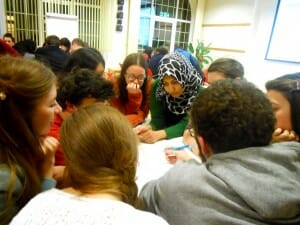
Feb 19, 2015 | Focolare Worldwide
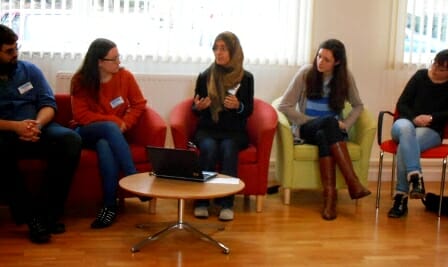 The group of 80 young Christians and Muslims. The topic: multiculturalism, religious diversity and dialogue. The question: Do you care? The format: to “Regenerate,” with two days at Hertfordshire, in a relaxed atmosphere where even burning issues were able to be discussed. The protagonists were young people from the Focolare Movement in Great Britain and Ireland and, this year, a group from the Islamic Unity Society with whom there has been growing friendship and mutual esteem, several projects, study sessions and planting peace trees. Participants listened directly to the experience of Dr Mohammad Ali Shomali, Director of the Islamic Centre of England, who spoke in video conference from Paris. He encouraged the group to “encourage opportunities of dialogue with everyone: dialogue is what characterises us as human beings. Accepting to dialogue with anyone who is different from us does not diminish us, but makes us more true to ourselves.”
The group of 80 young Christians and Muslims. The topic: multiculturalism, religious diversity and dialogue. The question: Do you care? The format: to “Regenerate,” with two days at Hertfordshire, in a relaxed atmosphere where even burning issues were able to be discussed. The protagonists were young people from the Focolare Movement in Great Britain and Ireland and, this year, a group from the Islamic Unity Society with whom there has been growing friendship and mutual esteem, several projects, study sessions and planting peace trees. Participants listened directly to the experience of Dr Mohammad Ali Shomali, Director of the Islamic Centre of England, who spoke in video conference from Paris. He encouraged the group to “encourage opportunities of dialogue with everyone: dialogue is what characterises us as human beings. Accepting to dialogue with anyone who is different from us does not diminish us, but makes us more true to ourselves.”  The honoured guest was Angela Graham who worked at BBC. Raised in Northern Ireland, she began from her own experience as she encouraged the young people to become “people of dialogue” within their own environments, trying to build bridges with people of other cultures and faiths. During the weekend of February 14-15, 2015 at the Focolare Centre for Unity which welcomed them in Welwyn Garden City there were workshops on the various topics: from interreligious dialogue to the social media; from politics to social commitment. “It’s quite striking to experience here people who are so passionate about living and working with God,” said Mohammed Mozaffari, one of the young Muslim men from the Islamic Unity Society. Lucia, from the Young for Unity group remarked: “The differences are not an obstacle, but an aid for building something together.” “Even those who had difficulty in identifying with a formal religion felt quite at ease, and builders like the rest of us,” say Nino and Mil who were among the organisers of the event. The event did not go unnoticed by civil leaders. Town Councilman, Michal Siewniak, stated: “It is encouraging to see young adults from different cultural and religious backgrounds becoming mutually involved in dialogue, and together looking for answers on how to live in harmony within a multicultural and multi-religious society.”
The honoured guest was Angela Graham who worked at BBC. Raised in Northern Ireland, she began from her own experience as she encouraged the young people to become “people of dialogue” within their own environments, trying to build bridges with people of other cultures and faiths. During the weekend of February 14-15, 2015 at the Focolare Centre for Unity which welcomed them in Welwyn Garden City there were workshops on the various topics: from interreligious dialogue to the social media; from politics to social commitment. “It’s quite striking to experience here people who are so passionate about living and working with God,” said Mohammed Mozaffari, one of the young Muslim men from the Islamic Unity Society. Lucia, from the Young for Unity group remarked: “The differences are not an obstacle, but an aid for building something together.” “Even those who had difficulty in identifying with a formal religion felt quite at ease, and builders like the rest of us,” say Nino and Mil who were among the organisers of the event. The event did not go unnoticed by civil leaders. Town Councilman, Michal Siewniak, stated: “It is encouraging to see young adults from different cultural and religious backgrounds becoming mutually involved in dialogue, and together looking for answers on how to live in harmony within a multicultural and multi-religious society.”
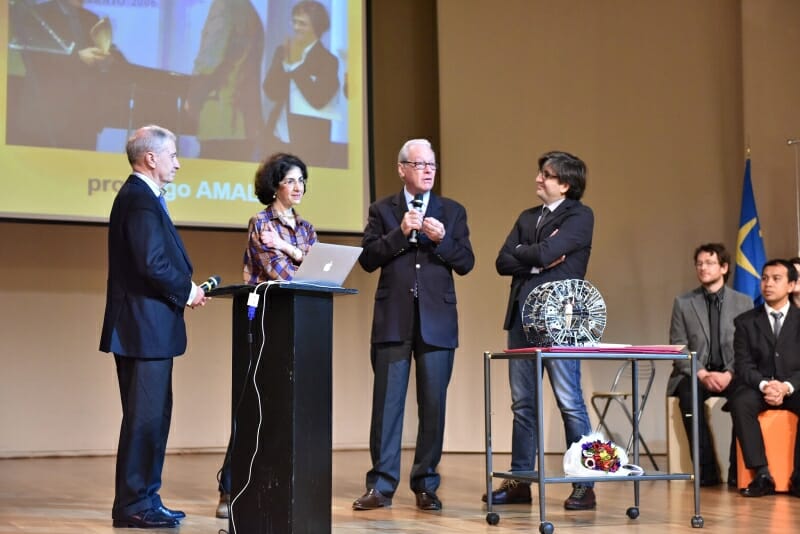
Feb 17, 2015 | Focolare Worldwide
 The infinitely small and infinitely big that interact to explain the universe, the application of discoveries such as the Higgs boson, in the medical, technological and social fields. Fabiola Gianotti, the next director of the CERN (European Nuclear Research Centre.) of Geneva, spoke about this on 15 February in Loppiano, before an audience of 800 people among which were scientists, enthusiasts of the scientific world, artists, friends, families and about 200 secondary school students.
The infinitely small and infinitely big that interact to explain the universe, the application of discoveries such as the Higgs boson, in the medical, technological and social fields. Fabiola Gianotti, the next director of the CERN (European Nuclear Research Centre.) of Geneva, spoke about this on 15 February in Loppiano, before an audience of 800 people among which were scientists, enthusiasts of the scientific world, artists, friends, families and about 200 secondary school students.
In short, it seems that science has once again become fashionable in 2015, year in which people are still beset by the economic crisis, but are likewise in search of “infinite spaces that re-focus on what we are, our dignity, and mission in life,» one of those in the audience said. The merit certainly goes to scientists like Gianotti, but also to events like the awarding of the Prize, “Renata Borlone, woman of dialogue.” It was an event of great educational values, where faith and culture intertwined to bring about moments of personal and social growth.
Dr. Giannotti received innumerable messages of congratulations, among which was that from Maria Voce: «The Renata Borlone Cultural Association and Sophia University Institute (IUS) join in the general acclaim, underlining in a particular way, the values that inspire Dr. Giannotti’s life as a woman and scientist.» The Focolare President stressed “the kinship of ideals and objectives of these two figures” (Gianotti and Borlone), though in diverse fields.
«The Higgs boson is considered as the site that gives rise to all the mass of particles in the universe – affirmed Lida Ciccarelli, postulator of the cause for the beatification of Renata Borlone – Renata too was fascinated, not only by science but by all that regards humanity, and had found that site, that field which had given meaning to her life and her daily existence: God. And just as the scientist moves to lift the veil of mystery surrounding the world of science – she continued – she had found in God the revelation of the “other” who asks for love, acceptance, comprehension, and sharing of joys and sufferings, with a human heart. She lived in this divine space and those whom she encountered found a renewed dignity in discovering that they are sons of God.»
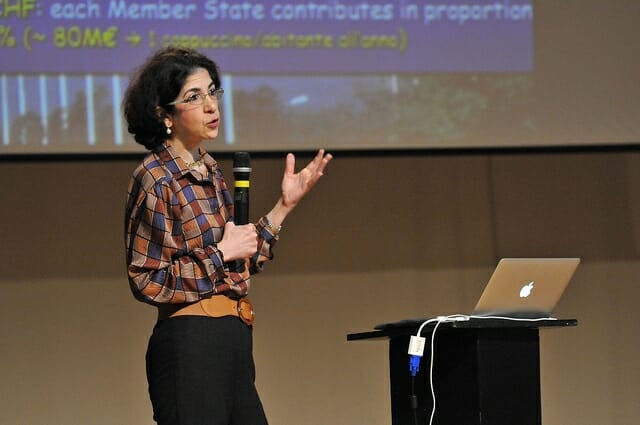 The Prize’s third edition was intended for scientific research enthusiasts and targets to also promote dialogue with those in the academic field who commit themselves to promoting a culture that respects the dignity of the human person. The reason for the conferment of the prize to Fabiola Gianotti, was read by IUS Prof. Sergio Rondinara: “For her elevated professional qualities, her passion in scientific research and her human capacity in guiding a great number of scientists and researchers involved in the CERN’s ATLAS experiment.”
The Prize’s third edition was intended for scientific research enthusiasts and targets to also promote dialogue with those in the academic field who commit themselves to promoting a culture that respects the dignity of the human person. The reason for the conferment of the prize to Fabiola Gianotti, was read by IUS Prof. Sergio Rondinara: “For her elevated professional qualities, her passion in scientific research and her human capacity in guiding a great number of scientists and researchers involved in the CERN’s ATLAS experiment.”
The prize statue is a work of the Chinese artist, Hung, and represents a miniature of a particle accelerator.
Dr. Giannotti’s speech was an intense and passionate exposition that captivated the audience’s attention, and she conducted them on a virtual tour of the universe of infinitely tiny, elementary particles and especially the Higgs boson, discovered at the end of 2012 thanks to the constant work of 3,000 scientists of 38 countries and the technology of the particle collider LHC (Large Hadron Collider), 27 km long, laid out at 100 meters under the ground between Switzerland and France.
«Some of you may wonder: what is so important about these particles? – the scientist said – in reality this question is intrinsically related to our lives, since if the particles did not have the masses they possess, we would not exist. If the electron did not have a mass, the atoms would not bond together and, therefore, chemistry would not exist and there would be no matter, the way we know it. So we exist also thanks to this Higgs mechanism.»
As to the applications of particle collider, she explained that these are widely used in the medical field to cure tumors. Dr. Giannotti concluded that the CERN research investigates fundamental queries on elementary particles and, therefore, on the structure and evolution of the universe, which are vital for their impact on daily life. «But the fundamental knowledge – she concluded – is in itself important because it is one of the irrevocable rights of man – beyond all the concrete applications, and is somewhat like art which is among the highest expressions of man as a knowledgeable being. And so, to negate the absolute importance of these activities would be like degenerating human nature itself.»
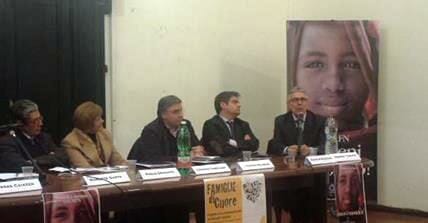
Feb 16, 2015 | Focolare Worldwide
 All the documents are stamped and now the child is a son or a daughter in every respect, a child upon whom to to pour all that love, which adoptive parents always have plenty of. Years of waiting and ocean-crossings did not stop them. After a first fleeting encounter in which child and parent became acquainted and some brief stays at hotels abroad, they are finally home. It is a unique and exhilarating experience to witness the completion of an adoption, however, more than a completion, it is also the beginning of an uphill journey. The first hurdle overcome, the newly diplomated parents are assailed by a thousand questions and often feel disoriented. It was for families such as these that “Families of the heart” was begun in Grazzanise, Italy, the brainchild of the Action for New Families Onlus (AFN), and with contributions from the Banco di Napoli Foundation, The project offers a one-stop free counseling service for adoptive families in a local area that provides expert advice, or simply the opportunity to meet with other families. It also provides free courses in which theoretical classes are alternated with social gatherings to promote an exchange of experiences between families, as well as the possibility of networking with other associations in the area. Adoption continues to remain a challenge because to this day still too many children are abandoned in institutions, both in the North and the South. It is a challenge that Chiara Lubich wanted to take on when, in 1967, she invited families who followed her to “empty the orphanages.” And that was how a myriad of families with or without children, opened heart and home to children who did not have a family, providing healing for their wound of abandonment. Mr and Mrs Gravante are responsible for the New Families Project in Campania. They explain: “Through this project we wish to equip families with tools that will strengthen their resources and help them to become world-families, open to the diversity of a daughter or son who comes from a faraway land with both genetic and cultural differences. It is a fascinating process but also demanding, as is retracing the life experiences of a child and helping him or her to make peace with them.” At the New Families Project – as with all authorised international adoption agencies – it is required to follow up with the family for the first three years of post-adoption, but often this time frame is not long enough. The process of the child’s integration in the new family and his or her inclusion in the social structures of an area, can require much more time. The adoptive families, far from being left on their own, need to have a relationship with other families like them, so that each day they can rediscover the value of their choice and regain their initial enthusiasm as they plan for the future, through a process that is the fruit of sharing. Stressing that this partnership is precisely what animates the association, Andrea Turatti, President of the New Families Project remarks: “We are also pleased to offer our thanks for the generous participation of the Bank of Naples in this opportunity for the territory of Naples, a region that well deserves it. In fact, of the 850 children who have found a family through the New Families Project, 180 have been welcomed into this region. And it was the maturity of this region that allowed the launching of the project that we hhope to export to the rest of Italy and beyond as a contribution to a more united society. ” For information: www.afnonlus.org
All the documents are stamped and now the child is a son or a daughter in every respect, a child upon whom to to pour all that love, which adoptive parents always have plenty of. Years of waiting and ocean-crossings did not stop them. After a first fleeting encounter in which child and parent became acquainted and some brief stays at hotels abroad, they are finally home. It is a unique and exhilarating experience to witness the completion of an adoption, however, more than a completion, it is also the beginning of an uphill journey. The first hurdle overcome, the newly diplomated parents are assailed by a thousand questions and often feel disoriented. It was for families such as these that “Families of the heart” was begun in Grazzanise, Italy, the brainchild of the Action for New Families Onlus (AFN), and with contributions from the Banco di Napoli Foundation, The project offers a one-stop free counseling service for adoptive families in a local area that provides expert advice, or simply the opportunity to meet with other families. It also provides free courses in which theoretical classes are alternated with social gatherings to promote an exchange of experiences between families, as well as the possibility of networking with other associations in the area. Adoption continues to remain a challenge because to this day still too many children are abandoned in institutions, both in the North and the South. It is a challenge that Chiara Lubich wanted to take on when, in 1967, she invited families who followed her to “empty the orphanages.” And that was how a myriad of families with or without children, opened heart and home to children who did not have a family, providing healing for their wound of abandonment. Mr and Mrs Gravante are responsible for the New Families Project in Campania. They explain: “Through this project we wish to equip families with tools that will strengthen their resources and help them to become world-families, open to the diversity of a daughter or son who comes from a faraway land with both genetic and cultural differences. It is a fascinating process but also demanding, as is retracing the life experiences of a child and helping him or her to make peace with them.” At the New Families Project – as with all authorised international adoption agencies – it is required to follow up with the family for the first three years of post-adoption, but often this time frame is not long enough. The process of the child’s integration in the new family and his or her inclusion in the social structures of an area, can require much more time. The adoptive families, far from being left on their own, need to have a relationship with other families like them, so that each day they can rediscover the value of their choice and regain their initial enthusiasm as they plan for the future, through a process that is the fruit of sharing. Stressing that this partnership is precisely what animates the association, Andrea Turatti, President of the New Families Project remarks: “We are also pleased to offer our thanks for the generous participation of the Bank of Naples in this opportunity for the territory of Naples, a region that well deserves it. In fact, of the 850 children who have found a family through the New Families Project, 180 have been welcomed into this region. And it was the maturity of this region that allowed the launching of the project that we hhope to export to the rest of Italy and beyond as a contribution to a more united society. ” For information: www.afnonlus.org

 «The country is undergoing a very difficult period. In fact a police contingent sent to arrest some terrorist suspects, was attacked by the fighters of the Moro Islamic Liberation Front and 44 policemen were killed. The Parliament was just deliberating on the new peace treaty between the government and Muslims of Mindanao, with extensive grants in many fields. However, these were blocked and yesterday a video network showed the video of a wounded policeman who was repeatedly beaten to death by a militant of the Front. The indignation of the people was unimaginable!» wrote Carlo and Ding from Manila. Oscar works instead in the government’s Communications Office which therefore had to report on the event. It was not an easy task for one like him who is daily committed to living the spirituality of unity with everyone. «In my job – he wrote– I have to oversee all that happens in the Social Media. This morning I saw the video of our SAF people (policemen) killed by the Muslim rebels. I was very shocked on seeing a policeman on the ground, wounded but still alive, being hit twice on the head and another gutted out with a sickle in his chest… It was terrible, almost surreal, and I couldn’t breathe. The video also showed the rebels gather the arms and personal effects of the policemen and then continued to shoot. It was so hard to think of peace while I was watching those images. I wanted to react, do something. I was almost in tears. Then, watching the sessions of Parliament regarding the event. Some tried to blame a general for his imprecise instruction, and others accused other officers for lack of coordination. Once again I thought, how can we talk of peace? The video on the internet has already been viewed by at least four million people. Part of my work consists in seeing the possible scenarios of a way out. So I ask myself what could be the worst scenario, and I felt fear. I imagine that after seeing those images, many could be overcome by anger and seek revenge. They could see in every Muslim a possible aggressor and turn against him. “And what if a civil revolt is triggered?” I wondered. In the office, as can be imagined, my colleagues were highly emotive. I tried to listen to what God was saying to me in my heart: “More than ever we have to speak of peace. If those among us who have a better view of the situation feel these sentiments of revenge, how will the more emotive and less informed people react?”
«The country is undergoing a very difficult period. In fact a police contingent sent to arrest some terrorist suspects, was attacked by the fighters of the Moro Islamic Liberation Front and 44 policemen were killed. The Parliament was just deliberating on the new peace treaty between the government and Muslims of Mindanao, with extensive grants in many fields. However, these were blocked and yesterday a video network showed the video of a wounded policeman who was repeatedly beaten to death by a militant of the Front. The indignation of the people was unimaginable!» wrote Carlo and Ding from Manila. Oscar works instead in the government’s Communications Office which therefore had to report on the event. It was not an easy task for one like him who is daily committed to living the spirituality of unity with everyone. «In my job – he wrote– I have to oversee all that happens in the Social Media. This morning I saw the video of our SAF people (policemen) killed by the Muslim rebels. I was very shocked on seeing a policeman on the ground, wounded but still alive, being hit twice on the head and another gutted out with a sickle in his chest… It was terrible, almost surreal, and I couldn’t breathe. The video also showed the rebels gather the arms and personal effects of the policemen and then continued to shoot. It was so hard to think of peace while I was watching those images. I wanted to react, do something. I was almost in tears. Then, watching the sessions of Parliament regarding the event. Some tried to blame a general for his imprecise instruction, and others accused other officers for lack of coordination. Once again I thought, how can we talk of peace? The video on the internet has already been viewed by at least four million people. Part of my work consists in seeing the possible scenarios of a way out. So I ask myself what could be the worst scenario, and I felt fear. I imagine that after seeing those images, many could be overcome by anger and seek revenge. They could see in every Muslim a possible aggressor and turn against him. “And what if a civil revolt is triggered?” I wondered. In the office, as can be imagined, my colleagues were highly emotive. I tried to listen to what God was saying to me in my heart: “More than ever we have to speak of peace. If those among us who have a better view of the situation feel these sentiments of revenge, how will the more emotive and less informed people react?”  One of my colleagues suddenly said: “Peace is unpronounceable at this moment. We have to focus on the unity of all the Filipinos, beyond every religious creed. And another said “What happened was an act of violent men who cannot be identified with the entire Muslim community.” Slowly, the anger began to die down. We also remembered what a Mindanao deputy had said: “We are easily angered and influenced by our emotions, because we have not seen with our own eyes the effects a war at our doorstep would have. War is not the answer.” I was pleasantly surprised and left the meeting with a sort of peace inside. In these times, more than anything else, I think we have to work together to bring the ideal of unity to as many people as possible. The menace of war is real. The menace of our compatriots who are angry with our Muslim brothers is real. But the Gospel shows us the path of dialogue and peace. Tomorrow will be a new day for me, another day of listening to many conversations online. I will have the chance to build relationships based on trust and peace. »
One of my colleagues suddenly said: “Peace is unpronounceable at this moment. We have to focus on the unity of all the Filipinos, beyond every religious creed. And another said “What happened was an act of violent men who cannot be identified with the entire Muslim community.” Slowly, the anger began to die down. We also remembered what a Mindanao deputy had said: “We are easily angered and influenced by our emotions, because we have not seen with our own eyes the effects a war at our doorstep would have. War is not the answer.” I was pleasantly surprised and left the meeting with a sort of peace inside. In these times, more than anything else, I think we have to work together to bring the ideal of unity to as many people as possible. The menace of war is real. The menace of our compatriots who are angry with our Muslim brothers is real. But the Gospel shows us the path of dialogue and peace. Tomorrow will be a new day for me, another day of listening to many conversations online. I will have the chance to build relationships based on trust and peace. » 


 we chose Nairobi,
we chose Nairobi, 



